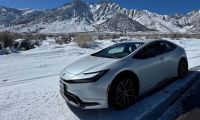If you own a Subaru Forester, Outback, Crosstrek, or another all-wheel-drive model, you are probably asking, "Why do I need snow tires if I have all-wheel-drive? Or can I get by with the all-season tires on my new car?" It all depends on where you live and how much extreme weather you will experience.
Consumer Reports identified "standout tires and brands with the best cold-weather grip," according to an updated ranking. Check out the highest-rated winter/snow tires from CR (by subscription) below. Click on each red tire link to get more information.

What are the best winter tires for a Subaru or other all-wheel-drive vehicle?
Consumer Reports rates the Bridgestone Blizzak WS90 (price $131) treads as the best overall winter/snow tires. They score high in icebreaking, snow traction, and hydroplaning. The report says the Michelin X-Ice Snow is another top pick scoring slightly better than the Continental VikingContact 7.
Consumer Reports says, "The Blizzak WS90 has the most consistent scores across our tests and excels in resistance to hydroplaning, giving a slight edge over the Michelin. The Michelin is quieter and has a better rolling resistance rating than the Bridgestone, which aids fuel economy. The Continental has the best ride comfort, noise, and rolling resistance scores of the three."

What is the best performance snow tire?
The top performance tire pick for the Subaru WRX, STI, and BRZ is the Bridgestone Blizzak LM005 (price $278). CR says, "It excels in hydroplaning resistance, snow traction, and ice braking—the very reasons you should consider this category. It's also above average for dry braking; a characteristic often compromised in this category."
Tying it is the less expensive Hankook Winter I*cept Evo 3. CR says it matches the hydroplaning resistance, snow traction, and ice braking ratings but trails the Bridgestone in other measures. The Vredestein Wintrac Pro and Michelin Pilot Alpin PA4 follow those tires closely, conceding just one point in CR's overall score. All four tires are CR-recommended.
What if I do some occasional winter driving?
CR says the best all-around all-season and all-weather SUV tires are the Michelin CrossClimate SUV (price $205.50). For Subaru Forester, Outback, or Crosstrek drivers who experience occasional winter driving conditions, CR says, "Many all-season SUV tires performed well overall in our tests, but the top tire is the Michelin CrossClimate SUV. It offers impressive snow traction without sacrificing grip on cleared roads. It comes in a variety of sizes to fit many popular SUVs. If there's one shortcoming, it's the tire's 40,000 miles of predicted tread life."
The Vredestein HiTrac follows the Michelin CrossClimate SUV. CR says, "the Vredestein HiTrac is a well-rounded tire, "delivering a good balance of all-weather grip and handling and 55,000 miles of predicted tread life."

What if I keep my tires on year-round?
If you don't want to change your tires next spring, CR recommends the General Altimax RT43 (price $130.99) for Subaru SUVs. CR says, "The General Altimax RT43 delivers excellent snow traction, resistance to hydroplaning, and ice braking performance."
When you get new treads for winter, you should get four winter/snow tires of the same size and identical category to maintain optimal driving performance. Buying the right winter tires can give you instant "bolt-on" traction, confidence, and control for your 2023 Subaru Forester, Outback, Crosstrek, or another Subaru model year or vehicle.
You Might Also Like: 10 New Upgrades On The 2023 Subaru Outback, 5 You Didn’t Know About
Denis Flierl has invested over 30 years in the automotive industry in a consulting role working with every major car brand. He is an accredited member of the Rocky Mountain Automotive Press. Check out Subaru Report where he covers all of the Japanese automaker's models. More stories can be found on the Torque News Subaru page. Follow Denis on Facebook, Twitter, and Instagram.
Subaru Report - We’ve got you covered! Check back tomorrow for more unique, informative SUBARU news, reviews, and previews you can trust.
Leave your comments below, share the article with friends and tweet it out to your followers!
Photo credit: Subaru
Set Torque News as Preferred Source on Google












Comments
Nokian WR G4 are good all
Permalink
Nokian WR G4 are good all weather tires.
Where in the world must
Permalink
Where in the world must someone live to new both awd AND winter tires? I live in Chicago which gets hammered with its fair share of sub zero temps and deep snow. I get by with all season tires on my fwd and awd vehicles. The only thing that gets winter tires are the rwd cars. IMO it defeats the purpose of an awd vehicle if you still have to swap tires every season.
Interior Alaska. The Rockies.
Permalink
In reply to Where in the world must by NMK (not verified)
Interior Alaska. The Rockies. The Northeast, with their lake-effect and North Atlantic moist air causing MASSIVE snowfalls. Interior of Canada and the northern USA, with their temps below -30F for weeks at a time, which will turn tire compounds not rated for severe winter conditions into hard blocks that offer little traction.
Sometimes snow gets packed into ice for several weeks. This is especially true in areas away from cities and suburbs. The roads may not get plowed or salted like the area around Chicago does.
AWD/4WD also doesn't always help much when steering or stopping on ice or cold pavement. Chains, studs, and to a lesser extent, winter-rated compound and siping DO.
I use all-weather ATs on my Crosstrek. All-weather compounds stay pliable in cold temps, unlike summer compounds and most all-season compounds, yet doesn't disintegrate on warm roads like winter-only compounds do. The tread has a LOT of siping. The tires are rated for severe winter conditions, unlike many all-season tires. They typically steer, stop, and start better on icy, snowy, and cold pavement than tires without the severe winter rating. I still prefer siped mudders for deep snow, but they typically aren't as good on icy/cold roads.
Check out the Falken Wildpeak AT Trail, Michelin CrossClimate, Firestone Weathergrip, and many other ATs. Look for a mountain and snowflake symbol on the sidewalk.
Well said. Northern MI here.
Permalink
In reply to Interior Alaska. The Rockies. by Gulo (not verified)
Well said. Northern MI here. Have Wildpeak AT's on my wife's Subaru Crosstrek, and Cooper AT3 4S's on our son's Cherokee & my Grand Cherokee. (all AWD) Most "all season" tires are a joke in winter driving here.
I live in Vermont and when I…
Permalink
In reply to Where in the world must by NMK (not verified)
I live in Vermont and when I was in my teens/20s I drove on all seasons.. and it was terrifying. I slid many many times and almost went off the road many times.
Now I’m 35 w two kids and I don’t want to risk them.. or my new Subaru. I would rather be extra protected and not necessarily need them than not be prepared and need them.
As I live 45-50 min drive from work (in good weather..) and work in healthcare- I need a sturdy set of studded winter tires. You can def get by w all seasons.. but you may or may not end up in a ditch here.
This is very attention…
Permalink
This is very attention-grabbing, You're an overly professional blogger. I have joined your rss feed and look forward to looking for more of your great post. Additionally, I have shared your web site in my social networks